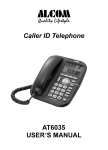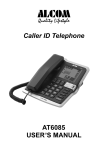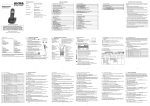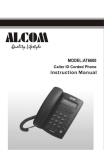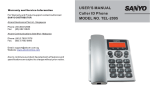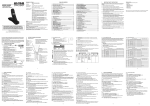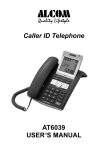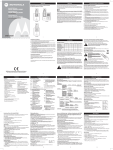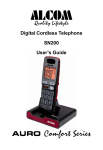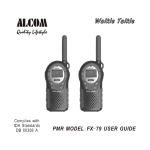Download ALcom E1000 User`s guide
Transcript
Elderly Friendly Mobile Phone E1000 User’s Guide Content 1. Safety information . . . . . . . . . . . . . . . . . . . . . . . . . . 4 2. General information . . . . . . . . . . . . . . . . . . . . . 5 3. Inserting the SIM card and the battery . . . . . . . . . . 5 4. Charging the battery . . . . . . . . . . . . . . . . . . . . . . . 7 5. Keys and connectors. . . . . . . . . . . . . . . . . . . . . . 9 6. Display and status symbols . . . . . . . . . . . . . . . . . .10 7. Switching on and off, key lock, emergency call functions . . . . . . . . . . . . . . . . . . . . . . . . . . . . . .11 8. Basic call functions . . . . . . . . . . . . . . . . . . . . . . . 13 9. Menu functions . . . . . . . . . . . . . . . . . . . . . . . . . . . 19 10. Optional Accessories . . . . . . . . . . . . . . . . . . 30 11 Care and user information . . . . . . . . . . . . . . . . 30 12. Additional safety information / SAR value . . . . . 32 2 Alcom E1000 The Alcom E1000 is an ergonomic GSM telephone that was developed in cooperation with industrial designers for customers that are looking for an elegant, reliable and easy to use mobile telephone. GSM Frequencies: Dual band Operation GSM 900/1800 Talk time: Up to 120 Minutes Standby time: Up to 170 Hours Display: Black and White Display with amber backlit for maximum contrast Ring tones: 16 different polyphonic ringtones Powerful speaker: 100 dB, vibration alarm Phone features: Three programmable quick dial keys (M1, M2, M2),Re-Dial of 10 last numbers, integrated handsfree function, Mute, keypad lock SMS features: Up to 160 characters per SMS, stores up 100 SMS messages Security: Emergency call function Organizer features: Phonebook with 500 entries (+ SIM), Clock with alarm (works when phone is switched off) 3 Dimensions: Approx. 128 x 50 x 17 mm Weight: Approx. 95g Interfaces: Headset jack (2.5 mm), Power supply Package content: Mobile Phone, 750 mAh Li-Ion rechargeable battery, 100 - 240V travel charger, Manual, Warranty card 1. Safety information Use the mobile telephone only in places where its use is not forbidden or could not pose a danger: Do not use the telephone in airplanes, in hospitals, at fuelling stations, in demolition ranges or in an automobile whilst you yourself are driving. Observe the valid laws and prohibitions and remember that they may change from time to time. Use only authorized accessories and in particular approved batteries. Incompatible accessories and faulty batteries can cause damages, even explosions. 4 2. General information This mobile telephone has been developed for operation in EGSM 900 and 1800 networks – further information on the services in these networks are available from your mobile communications provider. On direction of the mobile communications provider certain functions of this mobile telephone may have been deactivated or modified. For further information, please contact your mobile communications provider. This mobile telephone is not water proof – therefore keep it away from liquids. Keep the telephone, the power pack, the SIM card and other accessories out of the reach of children. Small parts might come loose that may be swallowed. When disconnecting cables, always pull by the plug and never by the cable. This telephone may be serviced and repaired only by authorized dealers. 3. Inserting the SIM card and the battery To protect the battery during transport it is not inserted in the mobile telephone. In case the dealer from whom you purchased the telephone has not already inserted the battery, follow the following steps. 5 Before using the mobile telephone you also need to insert a SIM card. Disconnect the mobile telephone from the power source for that and switch off the mobile telephone. 1. Remove the battery cover on the back side by sliding it to the case‘s base. 2. Take out the battery; remember beforehand the position of the battery in the mobile telephone with the contacts at top left. 3. Carefully insert the SIM card then: In doing so the golden contacts have to be placed downwards so that you cannot see them. The notch on the SIM card has to be at the top right. 6 4. Insert the battery again and finally slide the cover back onto the case. 4. Charging the battery The battery should be fully charged before starting up the mobile telephone. Use only the supplied power pack for that or the approved vehicle charging adapter. Use only the supplied battery or the approved substitute type. Appropriate instructions are available from your dealer or from the service hotline. The usage of other charging adapters or batteries may possibly invalidate the authorization or guaranty / warranty and may have dangerous consequences. Under no circumstances may you charge the telephone using the USB connection of a computer, because this may damage the computer and/or the telephone. 7 Connect the mobile telephone to the power pack. If the battery is completely discharged, it may take a few minutes before the telephone indicates that it is being charged and that it can be used for telephony. The telephone will indicate when the charging process has been completed. You can also use the optional charging cradle to charge the phone. 8 5. Keys and connectors 9 6. Display and status symbols The display has three areas: The status of the mobile telephone is indicated in the top area, the middle area shows call numbers or text messages, and selection functions in the menu or for the function keys are displayed at the bottom. The status symbols in the top area have the following meaning: Battery level Signal strength of the GSM network Alarm active Headset connected Keypad locked Roaming 10 Call divert active Missed call New SMS received Microphone muted Phone muted Only ringtone Only vibration Vibration then ringtone Vibration and ringtone 7. Switching on and off, key lock, emergency call functions The SIM card has to be inserted before using the mobile telephone. Refer to chapter 3. Press the Power/End key for about three seconds till the telephone switches itself on. You are then requested to enter the telephone code and/or the SIM code. 11 The telephone code can be issued by you as you wish and protects the telephone from unauthorized user. The telephone code is 1122 at delivery and does not need to be entered the first time it is switched on. With the PIN code that you get together with the SIM card you can protect the SIM card from user by unauthorized persons. The PIN2 code that you get together with certain SIM cards is needed for accessing certain services. In case you enter the PIN or PIN2 code erroneously three times in a row, you are requested to enter the PUK or the PUK2 code. Contact your mobile communications provider if you do not know these codes. To switch off the mobile telephone press the Power/End key as well until the telephone switches itself off. 7.1 Keypad lock The key lock prevents the accidental activating of keys or the making of calls for example when carrying the mobile telephone in your pants pocket. The key lock is activated by pressing the key for about three seconds. The key lock is indicated then by the symbol in the display‘s status line. 12 The key lock can also be activated automatically when the telephone is not used for a certain duration. This duration can be specified in the menus. To unlock the keypad, quickly press the keys and in succession. 7.2 Emergency Call Function If you press the emergency call key for a little more than a second, then a preset number is dialed automatically and the telephone switches into handsfree mode. The alarm number and the quick dial keys can be set in the menus. and Further information can be found in chapter 9.2. 8. Basic call functions 8.1 Making calls There are several ways to make a call: + Enter the telephone number with the prefix and if necessary the country code as well. + Redial: Press the Call/OK key to view a list of the last numbers called. Use the Up/Down keys to select the desired number. 13 + Press the Call/OK key to initiate the call. + Press the Down key the telephone book. and select a contact from + Additionally, you can select contacts from the telephone book (refer to chapter 9.4). + To place an international call you need to press a „+“ before the country code, which you get by pressing the key twice. + Some foreign telephone networks have extension lines that cannot be dialed as dial-through, but need to be entered by the key pad. To dial these directly as well, press the key quickly three times in a row after the telephone number .The „p“ character appears and then you can enter the dial extension. 8.2 Accepting a call and missed calls Depending on the profile, the mobile telephone will either ring and/or vibrate when there is an incoming call. You have the following options then: To accept the call, press the Call/OK key To reject the call, press the Power/End key To end the call, press the Power/End key 14 . . as well. If you have missed a call, you will receive a message on the phone’s display. By pressing the key (Read) you will see a list of all missed calls. With the Up/Down keys you can receive additional information on this call like date, time, etc. After pressing again (Option) you will see a menu with the following options: Delete Delete information on this call Save Save this number in the Phonebook Call Call this number Edit Edit this number, e.g. to add an international dialing prefix Delete All Delete the complete list with all information 8.3 Extended functions during a telephone call Note: Some of these functions depend on services that your mobile communications provider can provide. If during a running call another call comes in, you can either reject the new incoming call by pressing (Reject) or take the second call by pressing 15 (Answer). You will see then a menu with the following options: Answer Take the new call and set the other call on hold. Hold Hold the current call but do not answer the new call (yet). End End the current call and answer the new call. If you take the new call with Answer you can press for a menu with the following options: Swap: Swap between the calls Conference: Connect the calls to a conference Transfer: Transfer the call to another number End single: End a single call The other options in this menu are described in the next chapter. 8.4 Volume, mute and handsfree function The volume can be set to the desired level using the volume control keys. 16 If you press the Call/OK key (Option) during the telephone call, you can select the following functions from a menu: Hold: Put the current call on hold. H-Free: Switch on the handsfree function so that you can make a call without holding the phone in your hand - can be switched off in like manner. New Call: Put the current call on hold and make a new call (Conference). Phonebook: Switch to the Phonebook during a call to search for or add a contact. SMS: Write or read a SMS during a call. Mute: Mute the microphone, the other party cannot hear you; is switched off in like manner. DTMF: Send DTMF tones to control automatic dialog systems. The mute switches off the telephone‘s microphone or headset so that the other party can no longer hear your voice. By pressing the key (H-Free) you can directly switch on and off the handsfree speaker. 17 8.5 Profiles This phone provides two profiles: General Profile and Silent Profile. The General profile works according to the settings for ringtone, alarm, keytones and SMS alert that you have set in the menu or have been defined as factory settings. The Silent profile deactivates all acoustic signals. Incoming calls are only shown by the blinking display. This profile is useful when you are sitting in a restaurant or during a meeting so that other people will not be bothered. You can switch between the profiles by pressing the key as long as the phone shows the swap between the profiles. If you have activated the General profile and you want to mute an incoming call, briefly press the key. 8.6 Shortcuts The three functions that you use most can be defined as shortcuts so that you can access them quickly. To see a list of the Shortcuts press the Up key . Select the function you want and execute it by pressing the key (Open). 18 If you want to change the Shortcuts, press the key longer until a list of all functions appear on the display. 9. Menu functions When the phone is in idle mode press the key (Menu) to invoke the Main Menu. Press the Power/End key to exit the menu and return to the telephone mode. In all menus you can navigate with the Up/Down keys and activate your selection by pressing the key (OK). 9.1 Text Messages (SMS) 9.1.1 Writing Text Messages (SMS) Note: The length of text messages is limited; usually to 160 characters. If you want to send messages that are longer, then they are automatically split up into several messages, which your provider will charge you for individually. In the upper right corner of the display you will find information on the number of characters and messages, e.g. 70/1 (70 characters, first message). Press the key (Menu) Messages Write Message Enter the desired text then. Once you have written the message you can send it by pressing the key 19 (Send) along with a selection of further options from a menu: Send only: Send the text message, manual entry of the call number or selection from the telephone book. Save and Send: Send message and save it in folder Outbox. Save: Save the message in the draft box. Send to Many: Send text message to many recipients Send by group: Send text message to a group By pressing the key you can choose between different input modes for the text entry. The selected function is indicated at the top left of the display: abc: Entry only in small letters ABC: Entry only in capital letters 123: Entry of numerals Text input: Keep pressing the respective key until the desired letter appears on the display. To get an „L“ for example, you have to press the key three times. Use the Up/Down keys to move to any position in your message. Note: A selection of the most important special characters is presented when you press the key. 20 9.1.2 Inbox, Outbox and Draftbox When you receive a text message, an indication appears on the display. You can press the key (Read) twice to read the message directly or you press the key (Back) to read it later. To read it later, press key (Menu) MessagesInbox and select the desired message. In Outbox the text messages are saved that you have sent. Message Settings allows you to configure the following options: Voice Mail: Set and call the voice mail box Broadcast Message: Settings for Broadcast Messages (Service of your provider) Profile Setting: Settings for messages like service center number and storage duration 9.1.3 Voice Mail Voice messages come from the electronic answering machine that is provided by your mobile communications provider. Contact your mobile communications provider to learn how it is set up. 21 You have two options to listen to your voice mail messages: Press the „1“ key for a little longer than a second or go thru the menu as follows: Press key (Menu) Messages Messages Settings Voice Mail Connect to Voice Mail To set the Voice Mail details please choose the option <empty> or press key (Edit). 9.2 Set M1/M2/M3 The phone numbers that should be accessible as quick dial and or as emergency number must be stored as contacts in the phonebook before. For the emergency number you can choose with the option Handsfree if the phone should switch automatically into handsfree mode after the connection has been established. 9.3 Clock & Alarm 9.3.1 Time & Date Setting of the time and date, selection of the formats and separation characters for time and date. Also you can set here the home city for your time zone. If the battery was removed, then it may be necessary to reset the time and date. 22 9.3.2 Alarm The telephone features a wakeup function. You can set it to go off only once or repeatedly on a weekly schedule, ringing on weekdays that are set by you. Three different alarm times can be specified. To end the alarm press the key or the Power/End key otherwise the alarm will be repeated after 5 minutes. The alarm also functions when the telephone is switched off. When you confirm the alarm then, you are asked if you want to switch on the telephone. Please make sure that the phone is not switched to the Silent profile, otherwise you may not hear the alarm! 9.3.3 Show Time & Date If this menu is set to „On“ the phone will display time and date while not being in a call. 9.4 Phonebook Under contacts you can store telephone numbers and names either in the telephone or on the SIM card. 9.4.1 Search Enter the first letter of the searched for name. If necessary, you may have to press the respective 23 numerical key several times for a certain letter, e.g. press the key twice for the letter „E“. The corresponding names are listed on the display. By pressing the Call/OK key you can call up the respective contact. 9.4.2 Add new Using this function you can add another contact with name and telephone number. 9.4.3 Delete All Use this function to delete all contacts in the telephone or on the SIM card all at once. 9.4.4 Copy All This function can be used to copy the contacts from the SIM card to the telephone or vice versa. This function is useful for instance when you want to transfer contacts from one telephone via the SIM card to another telephone. 9.4.5 Caller Group Manage Caller Groups (Friends, Family, VIP, Business, Others) with its members and different ring tones. 9.4.6 Settings Memory Status: This function shows how much memory for new contacts is still available in the telephone and on the SIM card. There are SIM cards 24 available with various memory capacities. Ask your mobile communications provider. Fields: Define the fields in the contacts of the phonebook. My vCard: Here you can save your personal contact data and send it as a text message. 9.5 Calendar By pressing the Up/Down key you can select the desired date. By pressing the key (Option) you can also jump directly to the date by choosing Jump To Date. 9.6 Phone Settings 9.6.1 Display Settings Language: Language of the menu navigation Greeting Text: Brief message that is displayed when the telephone is switched on Screen Saver: Animation that will be started if the phone has not been used for a while. Set contract of the display Contrast: 25 LCD Backlight: Brightness and setting how long the back light should remain on. Font Size: The phone can show the menu’s in two different font sizes. 9.6.2 Sound Settings This phone has 4 different alerts. You can set the sound, the volume and vibration for each with this menu: Ring Tone: Alarm Tone: Alert that is being used for incoming calls Tone for alarm function (see also 9.3.2) Message Tone: Tone for incoming text messages Keypad Tone: Acoustic feedback for pressing a key You first must select which feature you want to change and then you can select the alert. Set Sound: 15 different melodies in addition you may download more into the phone Set Volume: Volume of the alert Alert Type: Vibration settings for this alert 9.6.3 Call Settings Most of the following functions are provided by the mobile communications network and can be not accessible or partly being disabled. 26 9.6.3.1 Caller ID Here you can select if your number should be transferred during the call. Set by Network: According to the pre-setting in your mobile phone network your ID will be send or not. Hide Id: Your ID will not be send. Send Id: Your ID will be send. Please not that some mobile phone providers do not allow hiding the ID. 9.6.3.2 Call Waiting This function allows you to put a call on hold and to make another call at the same time. You can either Activate or Deactivate this function. With option Check Status the network will show to you how this feature is currently set. 9.6.3.3 Call Divert Incoming calls are forwarded to a telephone number of your choice under conditions that you can set. 9.6.3.4 Call Barring With this function you can block calls from telephone numbers of your choice to avoid for example high phone rates while you are abroad. With Cancel All you can cancel all call restrictions. 27 9.6.3.5 Auto Redial The telephone automatically redials the desired call number up to ten times in case it cannot be reached. 9.6.3.6 Key LED flash To visualize incoming calls the phone can be set to blink with the key pad in addition to the display. 9.6.4 Network Setting With this option you can specify whether the mobile communications network should be selected automatically or whether you want to do the selection manually. 9.6.5 Set Fast key 2-9 Frequently used functions (no phone numbers) can be saved to the keys 2-9 so that you can call up this functions quickly by pressing the respective key for a little bit longer. Key “1” is reserved for voice mail. First select the key that you want to define and then press (Edit) to choose the function. 9.6.6 Security Setting 9.6.6.1 Main Menu Lock By this function you can block the access to the main menu so that the phone only can be used for phone calls and access to the Shortcuts (see 8.6). This is a useful feature to avoid that important settings (like emergency number, sound setting) can be changed 28 unintentionally. The Password for this function is 1122 at the time of delivery and can be changed with the option Change Password. 9.6.6.2 SIM Lock With this you can specify whether PIN 1 should be queried every time the telephone is switched on. 9.6.6.3 Phone Lock This function allows you to lock the phone separate from the SIM. Default setting for this password is 1122 and can be changed with the option Change Password. 9.6.6.4 Change Password The default password for the above mentioned function is 1122 and can be changed with this menu item. 9.6.7 Auto KeyLock Setting whether the key lock should be activated automatically after 5, 30 seconds, 60 seconds, 5 minutes or never. and To unlock the keypad quickly press the keys . 9.6.8 Restore Factory Setting All settings you have made are reset; the telephone can be returned to the status it was in when it was delivered. All data like phone numbers, text messages or contacts will be lost. 29 9.6.9 SIM Toolkit Here you may find options that are provided by your mobile phone service via the SIM card and that may be charged to your phone bill. 10. Optional Accessories The following genuine optional accessories are available for the senior phone: - Desktop charging cradle - High capacity battery (1050mAh / 750mAh) - Wired headset with microphone and one touch receive call button 11. Care and user information This telephone was developed and manufactured with utmost care. Please observe the following user instructions so that you can use the telephone for a long time and do not invalidate the warranty conditions: + Keep the telephone away from moisture and liquids. The telephone has various openings (e.g. for the loudspeaker) through which liquids can enter into the inside and thereby destroy the electronics. 30 + Do not use or store the telephone in dirty environments: Particles may enter into the inside and block mechanical components such as the keys. + Do not use or store the telephone at high temperatures, because this may damage the battery or cause the plastic parts to deform. + Keep the telephone also away from low temperatures: When the telephone returns to normal temperatures condensation may form inside that can cause damages. + Do not open the telephone except for inserting the battery and the SIM card. + Avoid mechanical loads such as shaking or dropping: This may damage the mechanical components or the display. + Do not use any aggressive cleansers, because they may harm the telephone‘s surfaces. + Do not paint the telephone or stick things on it. This may block the mechanics and the keys for example can no longer be pressed. + Do not modify the electronics of the mechanics of the telephone. This forfeits all licenses. + In case you send in the telephone for repair, you should if possible make a backup of all data (telephone book, notes, etc.). 31 The notes above also apply to the supplied accessories. In case the telephone does not function properly, bring it for repair only to an authorized service shop. 12. Additional safety information / SAR value Keep the telephone and the supplied accessories out of the hands of children, because small parts can get loose that can be swallowed by the children. Ambient conditions Please be sure to observe all valid regulations for the use of mobile telephones and switch it off when use is not permitted. Use the telephone only in the usual manner. The telephone meets all the radiation criteria when it is held to the ear in the usual manner or at a distance of at least 2.5 cm from the ear. If you are using a bag or a belt holster, it should not contain any metal and keep the safety distance mentioned above. In some cases transmission of data (e.g. text messages) is delayed until connection to the mobile communications network has sufficient quality. Make sure that even in the event of a delayed transmission the safety distance prescribed above is kept. The telephone contains magnetic components: This can attract metallic objects and the telephone should not be held in the vicinity of hearing aids. Furthermore, credit cards or other magnetic storage 32 media should be kept away from the telephone, because otherwise the data can be damaged. Medical equipment Any form of radio transmission, and this includes mobile telephones, can influence the function of medical equipment, in particular when these are not screened well enough. Switch the telephone off therefore in the vicinity of medical equipment – especially when requested to do so by appropriate signs. Pacemakers The manufacturers of pacemakers recommend a minimum distance of 16 cm/ 7 inches between a mobile telephone and the pacemaker to avoid malfunctions by interferences. This recommendation is also supported by independent scientific research. People that carry a pacemaker should therefore observe the following instructions: ++Always keep a minimum distance of 16 cm/ 7 inches between the telephone and the pacemaker. ++Do not transport the telephone in a breast pocket or near the pacemaker. ++During the telephone call, hold the telephone against the ear that is further away from the pacemaker. ++If there is any indication of interference, switch off the telephone immediately. 33 Hearing devices and hearing aids Some digital hearing devices can basically be disturbed by mobile telephones. In this case please contact the hearing device acoustician. Use in automobiles and airplanes The radio signals of mobile telephones can basically interfere with the electronic systems of automobiles and airplanes. Use the telephone therefore only in automobiles when this is explicitly permitted and observe the respectively valid regulations. Do not deposit the telephone or other parts in the vicinity of airbags. Airbags are inflated very quickly and the telephone can cause serious injuries when being hurled about. The use of telephones in airplanes is generally not permitted at the date of this print. Switch off your telephone when you board an airplane. These regulations may be changed in the future. Information on the current status can be gathered from your airline or your mobile communications provider. Explosive environments Switch off the telephone if you are in an environment where there is a risk of explosion. Observe all the pertinent regulations, because voltage peaks can trigger explosions in these environments that can cause serious, even fatal, injuries. Switch off the telephone therefore also in the vicinity of fuelling stations. 34 Explosive environments are usually clearly marked, for example with the directive that automobile motors should be switched off. In such cases the telephone must be switched off as well. Dangerous environments are for example fuel and gas storage, production and storage sites for chemicals, below deck on ships and areas where the air is loaded with for instance metallic or coal dust and the like. CERTIFICATION INFORMATION (SAR) THIS MOBILE DEVICE MEETS GUIDELINES FOR EXPOSURE TO RADIO WAVES. Your mobile device is a radio transmitter and receiver. It is Designed not to exceed the limits for exposure to radio waves recommended by international guidelines. These guidelines were developed by the independent scientific organization ICNIRP and include safety margins designed to assure the protection of all persons, regardless of age and health. The exposure guidelines for mobile devices employ a unit of measurement known as the Specific Absorption Rate or SAR. The SAR limit stated in the ICNIRP guidelines is 2.0 watts/kilogram (W/kg) averaged over 10 grams of tissue. Tests for SAR are conducted using standard operating positions with the device transmitting at its highest certified power level in all tested 26 frequency bands. The actual SAR level of an operating device can be below the maximum value because the device is designed to use only the power required to reach the network. That amount changes 35 depending on a number of factors such as how close you are to a network base station. The highest SAR value under the ICNIRP guidelines for use of the device at the ear is 0.332W/kg. Use of device accessories and enhancements may result in different SAR values. SAR values may vary depending on national reporting and testing requirements and the network band. Due to continuous product development all features and specifications are subject to change without prior notice, please register your warranty online at http://www.alcomonline.com/warranty.html For more Information on Warranty and Product Support in Singapore please call (65) 6841 2668 or Fax to (65) 6841 2628. Email : [email protected] Web : www.alcomonline.com All registered names and trademarks are property of their respective owners. © Copyright 2009 Giant Electronics Ltd. All rights reserved. 36




































